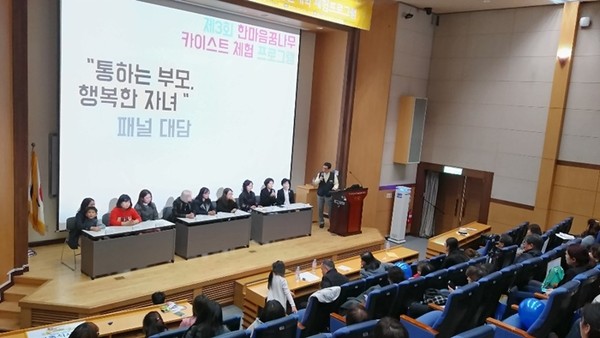Hanmaeum Education Corps (HEC) of KAIST held its 4th “Hanmaeum Dream Tree Program” at KAIST on November 2. The event invited students and parents of multicultural families to provide an opportunity for higher learning and to celebrate the accomplishments of mothers who have gone above and beyond to support their children’s education.
In the last five years, the number of elementary students from multicultural backgrounds has more than doubled in Korea. Yet, many children in multicultural families do not have access to the same level of education as that of their peers due to their parents’ lack of understanding of the competitive Korean education system or difficult financial situations that force both parents to work full-time.
To combat such problems, HEC was established in 2015 to help immigrant mothers overcome language and financial barriers in order to understand their children’s education system and to communicate with school teachers for better educational guidance at home. The center created Multicultural Mother Schools, which aim to encourage and educate mothers on guiding their children’s academic career, and eventually Multicultural Children Schools, which more directly bolster the children’s academic prowess and independent reasoning. So far, 12 Multicultural Mother Schools are in operation across the country.

This year’s “Hanmaeum Dream Tree Elite University Experience Program” invited children of the students and alumni of the Multicultural Mother Schools to help design a concrete blueprint for their future and foster global leadership. Around 570 affiliates, including alumni, teachers, and center officials, attended the event under the auspice of the Korean Association of Science and Technology Engineers, a KAIST alumni venture organization. The program consisted of presentations on excellent home guidance, lectures by adolescent education experts, debate panels, tours to the National Science Museum, science camp and creative learning programs, and a concert prepared by the members of the mother schools.
SEED, the student educational volunteering club, planned and led the science camp and creative learning programs, which focused on conducting hands-on scientific experiments typically excluded from regular school curricula in order to cultivate creative, scientific, and logical thinking.
In addition, the center held an awards ceremony to recognize outstanding mothers who have excelled in educational support in their homes, as well as those who have received perfect scores on the elementary school qualification exam, the Korean equivalent of General Educational Development (GED) tests.
Young-Gul Kim, the director of the KAIST Global Leadership Center, hosted the panel on children and education communication and expressed, “I hope that happy smiles and bright futures will spread throughout the multicultural families in Korea.”

